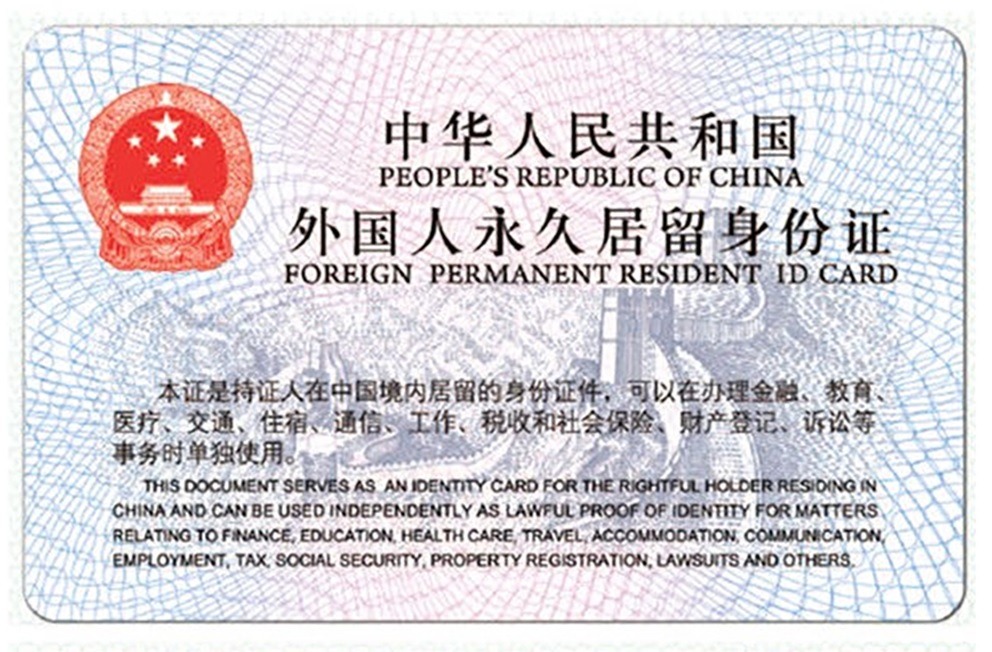
With its spectacularly successful fight against Covid-19 pandemic, China has proven itself to be a safe place to live in while much of the rest of the world is still panicking. So have you ever thought of permanently living in China?
Yes, get a China green card.
Since the Measures for the Administration on Examination and Approval for Foreigners’ Permanent Residence (hereinafter as “Measures”) came into effect in 2004, the standards for foreigners to apply for PRC Green Card were always pretty high. With the development of China’s “Opening-up” policy and the increasing demands of overseas talents, the government has issued a number of relevant policies for foreigners to facilitate their residency in China step by step, including the Opinions on Strengthening the Administration of Permanent Residence Services for Foreigners (hereinafter as “Opinions“) issued by the State Council in 2016 and the 12 Policies on Immigration and Entry- Exit Facilitation (hereinafter as “12 Policies”) issued by the National Immigration Administration in August 2019.
The Ministry of Justice issued the Regulations on the Administration of Foreigners’ Permanent Residence (Draft) (2020) (hereinafter as “Draft”) on February 27, 2020 for public comments. Since its release, the Draft has drawn much attention from expats living in China and from Chinese citizens. Compared with the previous policies, the Draft developed so much that it could become the new landmark of China’s permanent residence status (hereinafter as “PR Status”). This article will highlight the key points of the Draft as below, for your kind reference.
- Who are Eligible under the Draft?
The current Draft provides six categories of people that are eligible for permanent residency, including foreigners with outstanding contributions, foreigners with international recognized achievements, foreign talents introduced into China, foreigners working in China, foreigners making investment in China and foreigners who have family members living in China. The specific requirements of each category are summarized as follows:
1. 1 Foreigners with Outstanding Contributions
Foreigners who have contributed outstandingly towards China’s economic and social development (including development in science, technology, education, culture, health, sports, public welfare, Sino-foreign friendly exchanges, etc.) may apply for the PR Status after having been recommended by local governments at the provincial level.[1]
In the similar category in the 2004 Measures, the expression is that foreigners having made outstanding contributions to China may apply for the PR Status, if they satisfy some routine requirements such as being healthy and with no criminal record. The Draft lists more detailed conditions of the outstanding contributions, which can be regarded as a summary and a continuation of previous policies.
1.2 Foreigners with International Recognized Achievements
Foreign citizens who have achieved internationally recognized outstanding achievements in the fields of economy, science and technology, education, culture, health, or sports can directly apply for permanent residency.
Previously, some cities opened up their immigration policies in accordance with the needs of talents introduction. For example, the policy in Shanghai stipulates that foreigners with internationally recognized outstanding achievements brought to Shanghai can directly apply for permanent residence.
Thus, the Draft can be regarded as a promotion and a replication of previous practices, but the detailed criteria for “internationally recognized outstanding achievements” have not yet been determined by national immigration authorities in consultation with the relevant departments of the State Council.
1.3 Foreign Talents Introduced into China
Foreigners who will be introduced into China for making achievements for China’s economic and social development may apply for the PR Status. Such Foreigners include:[1]
- Urgently needed talents introduced by the state’s key industries and regions and recommended by the competent authority;
- Academicians and researchers with titles of assistant professors and above who have been introduced and recommended by the state’s key universities and research institutions, and professors and researchers who have been introduced and recommended by other universities and research institutions;
- High-tech enterprises, innovative enterprises, and senior management personnel and senior professional technicians introduced and recommended by domestic well-known enterprises; or
- Professionals recommended by foreigners who have obtained PR Status owing to their internationally recognized achievements.
The Draft provides that the above-mentioned talents must meet the respective specific qualification requirements. Additionally, applicants must obtain recommendation from either the Chinese authorities or qualified individuals. Further talent identification standards will be made based on consultation with relevant authorities.
1.4 Foreigners Working in China
Under Article 15 of the Draft is the newly added provision that stipulates that a foreign citizen may apply for PR Status if they are working in China with good tax and credit records, and satisfy one of the following situations:
- Having a doctorate degree or graduated from a well-known international university, and having worked in China for at least three consecutive years, during which the accumulated actual residence period is not less than one year;
- Working in one of the key industries or regions developed by the State for three consecutive years, during which the accumulated actual residence period is not less than one year, and the annual income is not less than four times of local average income of the previous year;
- Having worked in China for four consecutive years, during which the accumulated actual residence period is not less than two years, and the annual income is not less than six times of local average income of the previous year;
- Having worked in China for eight consecutive years, during which his accumulated actual residence period is not less than four years, and the annual income is not less than three times of local average income of the previous year.
There is a similar category in the Measures. However, the scope of eligibility under that category is quite narrower.[2] Therefore, few applicants met the requirements at that time. The 12 Policies relaxed the previous requirements on the position level for applicants, so that the requirements of introducing foreign talents are more in line with the market evaluation and the market demand.[3]
The Draft, on the basis of the 12 Policies, further relaxed the conditions and requirements for the China PR Status, by extending the policy that was previously applicable to Chinese expatriates to ordinary foreigners, increasing the cases of which people can apply for continuous work and actual residence, and relaxing the requirements for income and tax standards.
1.5 Foreigners Making Investment in China
A foreign citizen can apply for PR Status, if they i) make investments in China according to the Foreign Investment Law; ii) have made steady investments in China for three years; iii) possess a sound tax and credit record; and iv) meet any one of the following circumstances:[4]
- They have made at least RMB 10 million (roughly US$1.43 million at current exchange rate) investments in China;
- They have made investments in areas encouraged by China, and the investment value, tax payment, and Chinese employees meet certain conditions;
- They have set up high-tech or innovation firms in China and are recommended by provincial-level governments.
Based on the fact that some cities have set specific standards for applying for PR Status of foreign investment[5], the Draft combines the experience of different provinces, sets standards for the amount of investment all over the country, adds the criteria that can be applies and further establishes the requirements for PR Status applications for foreign investors.
Citizenship by investment has been a hot business in today’s world popular with small island countries, and some European countries offer residence by investment. It is a lucrative business and China like it as well but with much more stringent rules.
1.6 Foreigners Who Have Family Members Living in China
Those who need a family reunion can apply for permanent residency if they fall into one of the following circumstances:[6]
- The spouse is a Chinese citizen or a foreigner who resides permanently in China and has lived with the spouse in China for five years after marriage, and has accumulated actual residence of not less than nine months each year, with stable living security and residence;
- Children under the age of eighteen reside in China or live with foreign parents permanently residing in China;
- Those who have reached the age of sixty, have no immediate relatives abroad, and depend on immediate relatives of Chinese nationality living in China or foreign relatives of permanent nationality who have permanently resided in China, and must have stayed in China for five consecutive years, residing no less than 9 months every year, with stable living security and residence.
In addition, a foreign citizen’s spouse and children can apply for permanent residency at the same time, where any of the five eligible categories mentioned above are met.[7]
It is sad that in practice, we have seen several cases where a foreign wife was awarded with custody over their Chinese citizen child after divorcing their China husbands, they want to stay in China and get close to their Chinese citizen child, they are not given any chance of obtaining permanent residence in China.
2. How to Examine and Approve the Applications?
According to the Draft, the Exit-Entry Administration or the National Immigration Department of the public security organ of the place of residence shall carefully examine the applications including the applicants’ nationalities, credit records, work and life in China and all other relevant information. The time limit shall be 120 days and the time spent waiting for a quota shall not be included. A decision shall be made to deny the PR Status application to the foreigner who resorts to deception in the application process or who is unable to guarantee the living expenses necessary in China and other special circumstances.
Since it is stipulated that the time spent waiting for a quota shall not be included, a quota system may be introduced for foreigners who are eligible for permanent residence. The specific quota system remains to be further clarified. Therefore, although it seems that the Draft relaxes the requirements for PR Status, it remains to be seen how many foreigners will actually be granted PR Status after the formal regulation is implemented.
3. What Benefits will the Foreigner Who Has Obtained PR Status Enjoy?
Foreign citizens who are granted permanent residency have the same rights and the same obligations as Chinese citizens except the right to vote and the specific rights and obligations subject to PRC laws and regulations.
The relevant treatment and benefits include, but are not limited to, permanent residence in China, no additional visa for entry and exit, no need to apply for a work permit for employment, the education for children living with them, purchasing houses in accordance with the local regulations, participating in social securities and so on.
It shall be noted that under the Draft, foreigners with China permanent residence are still subject to restriction of purchasing properties in China, i.e., they can only buy one property for personal use, no speculation in the already out-of-control property market.
Preparing for Changes to Come
Once the formal regulation takes effect, foreigner who is in any one of the above six categories, can apply for PR Status at the Exit-Entry Administration Bureau of the public security organ of the place of residence. We will pay close attention to further revisions that are made by Chinese relevant authorities during their consultation process with regard to the detailed provisions on foreigners obtaining PRC “Green Card”.
[1] Article 13 of the Exposure Draft.
[2] Only foreigners employed by particular entities (e.g., high-tech companies), working in specific job positions (e.g., general managers), or having specific academic titles (e.g., professors), may apply for the PR Status while the other requirements are fulfilled as well, including the duration the Foreigner has stayed in China, and the amount of tax has been paid to the Chinese government.
[3] It is stipulated in the 12 Policies that foreigners working in China who have worked continuously for at least four years and have actually resided in China for at least six months each year, whose annual income is not less than six times the average income of where they are located in the previous year, and whose annual individual income tax is not less than 20% of the standard annual income “; “foreign Chinese working in China, holding a doctor degree or working in key national development field for at least four consecutive years, and actual residing for at least six months per year”, can apply for permanent residence.
[4] Article 16 of the Exposure Draft.
[5] In 2017, foreign investors in Guangdong Free Trade Zone whose companies with natural persons as controlling shareholders, direct investment in Guangdong Free Trade Zone, stable investment for 3 consecutive years, total investment amount of more than 1 million US dollars, and good tax record can apply for permanent residence.
[6] Article 17 of the Exposure Draft.
[7] Article 18 of the Exposure Draft.






Comments